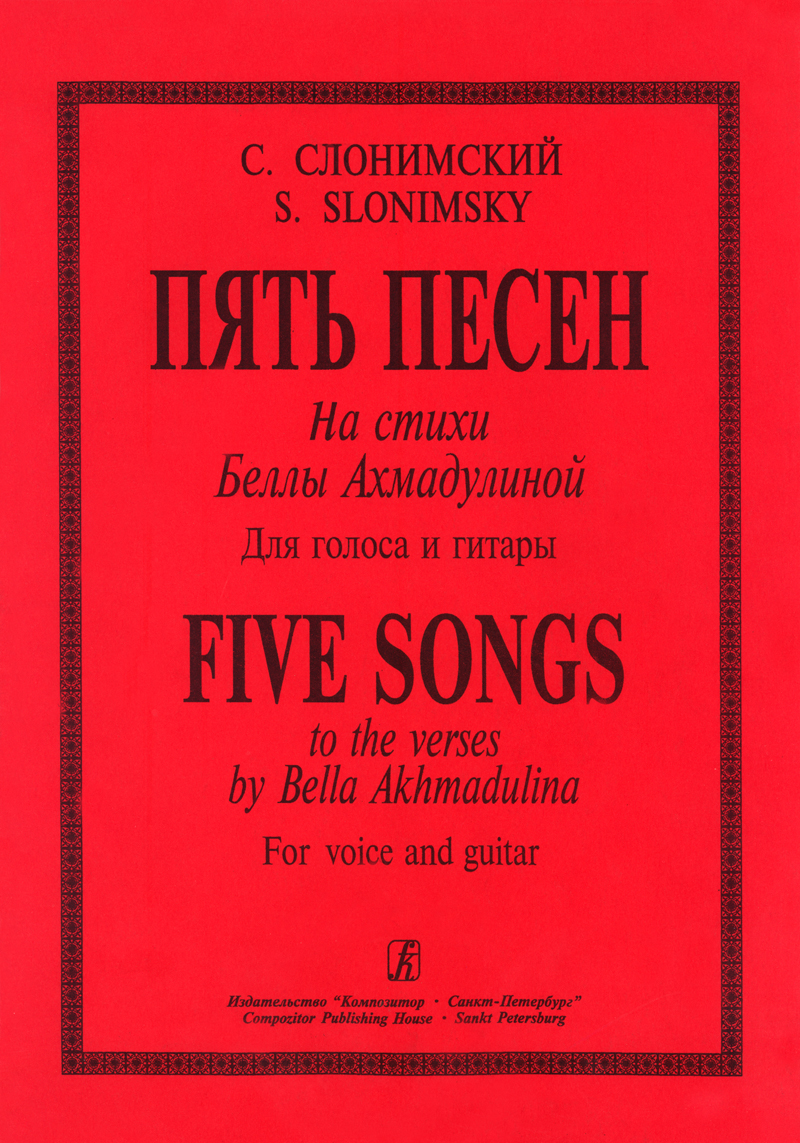
Slonimsky S. 5 Songs to the verses by B. Akhmadulina. For voice and guitar
- Author:
- Slonimsky S.
- Author (full):
- Sergei Slonimsky
- Title (full):
- Five Songs to the verses by B. Akhmadulina. For voice and guitar
- Number of pages:
- 8
Sergei Mikhailovich Slonimsky (born in 1932) is one of the leading modern Russian composers. His creation embraces actually all the genres. Remember the musical drama “Virineya” (1965–1967) after the novel by L. Seyfullina, chamber opera “Master and Margarite” (1970–1972) after M. Bulgakov, opera-ballad “Mary Stuart” (1978–1980) to Ya. Gordin's libretto, dramma per musica “Hamlet” (1990–1991) after the W. Shakespeare's tragedy translated to Russian by B. Pasternak, chamber opera (monodic drama) “King Ixion” (1993–1995) after the ancient myth and the tragedy by I. Annensky, the Russian tragedy in 14 visions with three epilogues and overture “The Visions of Ioann Grozny” to Ya. Gordin's libretto, dramma per musica “King Lear” (2000–2001) after the tragedy by W. Shakespeare translated by B. Pasternak, symphonies, instrumental concertos, cantatas, among which there is the “Voice From Choir” (1962–1963) to the verses by A. Blok, “One Day of the Life” (1998) to the texts by “Chapter of the Thousand” by Dhammapada translated by V. Toporov, Requiem for soloists, choir and symphony orchestra (2003), so as numerous choral, chamber-instrumental and vocal compositions. The spring of 2005 was marked by the ballet premi?re of the “Magic Nut” after the tale by E. Th. A. Hoffmann to the libretto by the artist Mikhail Chemiakine, who staged it in the Mariinsky Theatre.
Sergei Slonimsky is the professor of the Petersburg Conservatoire, People's Artist of Russia, laureate of the Russian State Prize, knight of the Commander Cross of the Order for Merits before the Polish Republic. Slonimsky's opuses are on roll all over the world.
Vocal cycle for female voice on the verse by Akhmadulina is a characteristic example of so called ‘author song’ which is composed and sung by amateurs with guitar accompaniment. According to the composer’s own words this genre is one of the most sincere ones. The Maitre interpreted these verses exactly in the simple, unpretending mood where rules not pathos but warmth and sincerity.
However the intonation of these songs is richer and much subtle than that of a simple author song. The music language of the songs is melted also from modern and folklore elements as well such as a pseudo folktune in Zhaleika, dance passage in the sentimental waltz I thought you to be my enemy. Even contemporary light music has its say in the album (two last songs of the cycle).
This edition in Russian.
Contents:
Nesmeyana (music text example)
Zhaleika
Ya dumala, chto ty moi vrag
V tot mesyac maiv
Ne udelyai mne mnogo vremeni
- Author
- Slonimsky S.
- Author (full)
- Sergei Slonimsky
- Title (full)
- Five Songs to the verses by B. Akhmadulina. For voice and guitar
- Number of pages
- 8
